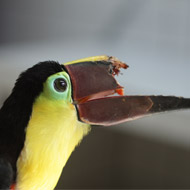
Lost half of his upper beak in shocking attack
A toucan which lost the top part of its beak in a shocking attack by a group of teenagers is set to receive a prosthetic replacement.
The injured toucan was first brought into the ZooAve animal rescue centre in Alajuela, Costa Rica. Although completely healthy, he was missing one half of its upper beak. It was later discovered that a group of teenagers had caused the injury by hitting the powerless bird with a stick.
Without a beak toucans are not able to eat and are defenceless against predators. Reproduction is also unlikely, as females choose their mates based on the beak's colour.
Information about the incident spread rapidly over the internet and an indigogo page was set up to fund a prosthesis. Thousands of pounds have already been donated and a number of local 3D design companies have stepped in to offer their help.
The company tasked with fitting the artificial beak specialise in creating custom prosthetics for animals in Denver, Colarado.
According to the BBC, Designer Nelson Martinez told newspaper La Nacion that his priority was to create a prostheis which would help the toucan to eat. He said that he and his team had been studying toucan beaks to come up with a suitable design.
Veterinary surgeon Carmen Soto, who is looking after the toucan, told the BBC that the bird was recovering well and has even started eating with a little help.
Within a month, Soto believes that it will be possible to scan the toucan's stump, which will be key to ensuring that the prosthesis fits correctly.
Mr Martinez said, "We couldn't use any type of adhesive with chemical components as it could compromise the structure of the beak."
The company is now looking into whether the beak could be fixed with screws instead.
Image (C) Rescate Animal Zoo Ave EN



 The Animal and Plant Health Agency (APHA) has updated its online reporting service for dead wild birds.
The Animal and Plant Health Agency (APHA) has updated its online reporting service for dead wild birds.